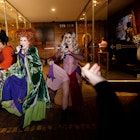

A mural dedicated to Irene Sendler, a heroine of the Holocaust who supported the Jews at great personal peril, is just some of the striking street art in the Kazimierz neighborhood © Jason Najum / Lonely Planet
Jewish history in Poland goes back more than a thousand years, when the country was the epicenter of European Jewish life. Always Poland’s cultural capital, Krakow in particular holds a special place in Jewish lore, with many a Yiddish poem written about the old Kazimierz neighborhood and its vibrant Jewish culture.
- placement: fullWidth
- path: articles/in-content-top
- possible size: [970, 250], [970, 90], [728, 90], [300, 250], [320, 50], [1, 1],
- targeting:
{ "url": "jewish-krakow" }
The horrors of the Holocaust ravaged Poland’s Jewish community to near-extinction, but lately there have been signs of a revival. Poles – Jews and Gentiles alike – are rediscovering their shared history as Jewish life and culture is slowly returning to Krakow.
Krakow’s Jewish history, an introduction
In the 1300s, King Kazimierz the Great ruled over the Kingdom of Poland from the capital of Krakow. He built castles and universities and granted Jews special rights and protections, allowing them to own land and practice their religion. The stability allowed the community to flourish, and Poland became home to as much as 80 percent of the world’s Jewish population. Krakow was the community’s beating heart.
By 1939, the start of the Nazi invasion of Poland, 25 percent of Krakow’s population was Jewish. But the destruction of World War II led to nearly five decades of Communism – a stagnating period that saw the loss of most of Poland’s remaining Jewish population. It also left neighborhoods like Kazimierz in desolation. It has been a long road back.
For millennia, Poles and Polish Jews lived as neighbors, undeniably linked by a shared heritage. By the turn of the 21st century, only traces of this history remained.
Rediscovering a shared history
In the 1980s a Catholic teenager named Janusz Makuch discovered his Polish hometown of Pulawy had once been 50 percent Jewish – yet he had never met a Jew in his life. His discovery of this lost history inspired a lifetime of exploration into his country’s Jewish heritage, leading to the creation of the Jewish Culture Festival in 1988.
- placement: fullWidth
- path: articles/in-content-middle
- possible size: [970, 250], [970, 90], [728, 90], [300, 250], [320, 50], [1, 1],
- targeting:
{ "url": "jewish-krakow" }
Over the past 30 years, the festival has grown into the biggest of its kind, with hundreds of events showcasing Jewish arts and culture. Staffed by dozens of dedicated volunteers, most of them young non-Jewish Poles, the work done by the festival team has helped spark a revitalization of Jewish life in Krakow. The Kazimierz neighborhood has been reborn. Now a hip urban neighborhood and tourist must-see, the “Jewish Quarter” is teeming with a mix of hipster cool and Jewish influence.
Krakow has always had some Holocaust visitors. The infamous Auschwitz concentration camps are an hour away, and Oskar Schindler’s factory from the film Schindler's List is now a museum in Krakow. Yet among Kazimierz’s winding old streets, a more sustained rejuvenation is taking place.
Szeroka street, once the hub of daily Jewish life in old Kazimierz, is now a walking area lined with Jewish, Polish, and Israeli restaurants. Ariel, one of the biggest and most authentic Jewish restaurants in town, offers a full menu of Yiddish classics from chopped liver to gefilte fish, with impressive old-world decor and live klezmer music.
On the far end of the strip you’ll find the Old Synagogue – dating to the 1400s it’s one of the oldest in Europe – and the Remuh Synagogue, a small but popular attraction neighboring one of the district’s poignant Jewish cemeteries.
Coming back from the brink
Stroll west from Szeroka and you’ll stumble upon street art commemorating Krakow’s Jewish history, and chic hummus bars with Hebrew scripture on the door frames. Everywhere are signs of the old blending with the modern to create something unique to today.
- placement: native
- path: articles/in-content-native
- possible size: [f, l],
- targeting:
{ "url": "jewish-krakow" }
One of the best examples is Hevre, a restaurant, bar and event space in the heart of Kazimierz. Housed in an old Jewish school and house of prayer, this hip hybrid now offers modern takes on classic dishes, with craft beers and cocktails to keep the young crowd happy. The faded original Hebrew murals are still on the wall – exposed instead of painted over. Speaking with the staff and owners, you get a sense they appreciate where they are and what came before.
This sense of place colors much of the daily life in today’s Kazimierz. Sure, there are tourist trinkets of smiling rabbis, but there is also Cheder, a Jewish cafe and educational space. Not to mention the Galicia Jewish Museum, and the Jewish Community Center (JCC), offering Jewish education, daycare and other community services.
Some might question the ethics of Poles commercializing Jewish history, but Jewish life in Krakow is finally stepping back into the light.
During the recent Jewish Culture Festival, Hevre played host to a Sabbath show in its event space, with traditional songs sung by a mixed group of Jews and gentiles. There's still a long way to go, but once again there are Friday night Sabbath celebrations in the heart of Krakow.
https://shop.lonelyplanet.com/products/poland-travel-guide-8
- placement: fullWidth
- path: articles/bottom
- possible size: [970, 250], [970, 90], [728, 90], [300, 250], [320, 50], [1, 1],
- targeting:
{ "url": "jewish-krakow" }
Explore related stories




 Local VoicesEverything you need to know about visiting New York in December
Local VoicesEverything you need to know about visiting New York in DecemberNov 25, 2024 • 10 min read
 ActivitiesCopy My Trip: Exploring Ecuador and the Galápagos with Elsewhere
ActivitiesCopy My Trip: Exploring Ecuador and the Galápagos with ElsewhereNov 25, 2024 • 5 min read




